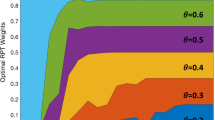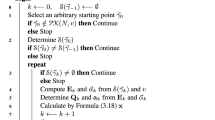Abstract
We suggest a new algorithm for two-person zero-sum undiscounted stochastic games focusing on stationary strategies. Given a positive real \(\varepsilon \), let us call a stochastic game \(\varepsilon \)-ergodic, if its values from any two initial positions differ by at most \(\varepsilon \). The proposed new algorithm outputs for every \(\varepsilon >0\) in finite time either a pair of stationary strategies for the two players guaranteeing that the values from any initial positions are within an \(\varepsilon \)-range, or identifies two initial positions u and v and corresponding stationary strategies for the players proving that the game values starting from u and v are at least \(\varepsilon /24\) apart. In particular, the above result shows that if a stochastic game is \(\varepsilon \)-ergodic, then there are stationary strategies for the players proving \(24\varepsilon \)-ergodicity. This result strengthens and provides a constructive version of an existential result by Vrieze (Stochastic games with finite state and action spaces. PhD thesis, Centrum voor Wiskunde en Informatica, Amsterdam, 1980) claiming that if a stochastic game is 0-ergodic, then there are \(\varepsilon \)-optimal stationary strategies for every \(\varepsilon > 0\). The suggested algorithm is based on a potential transformation technique that changes the range of local values at all positions without changing the normal form of the game.




Similar content being viewed by others
References
Andersson D, Miltersen PB (2009) The complexity of solving stochastic games on graphs. In: Proceedings of the 20th ISAAC, LNCS, vol 5878, pp 112–121
Basu S, Pollack R, Roy M (1996) On the combinatorial and algebraic complexity of quantifier elimination. J ACM 43(6):1002–1045 (Preliminary version in FOCS 1994)
Blackwell D, Ferguson TS (1968) The big match. Ann Math Stat 39(1):159–163
Boros E, Elbassioni K, Gurvich V, Makino K (2013) On canonical forms for zero-sum stochastic mean payoff games. Dyn Games Appl 3(2):128–161
Boros E, Elbassioni K, Gurvich V, Makino K (2013) On discounted approximations of undiscounted stochastic games and markov decision processes with limited randomness. Oper Res Lett 41(4):357–362
Boros E, Elbassioni K, Gurvich V, Makino K (2010) A pumping algorithm for ergodic stochastic mean payoff games with perfect information. In: Proceedings of the 14th IPCO, LNCS, vol 6080. Springer, pp 341–354
Boros E, Elbassioni K, Gurvich V, Makino K (2013) A pseudo-polynomial algorithm for mean payoff stochastic games with perfect information and a few random positions. In: Fomin FV, Freivalds R, Kwiatkowska M, Peleg D (eds) Automata, languages, and programming, LNCS, vol 7965. Springer, Berlin Heidelberg, pp 220–231
Boros E, Elbassioni K, Gurvich V, Makino K (2014) A potential reduction algorithm for ergodic two-person zero-sum limiting average payoff stochastic games. In: Zhang Z, Wu L, Xu W, Du DZ (eds) Combinatorial optimization and applications, LNCS, vol 8881. Springer, pp 694–709
Chatterjee K, Majumdar R, Henzinger TA (2008) Stochastic limit-average games are in exptime. Int J Game Theory 37:219–234
Chatterjee K, Ibsen-Jensen R (2014) The complexity of ergodic mean-payoff games. In: Proceedings of the 41st ICALP: 2, LNCS, vol 8573, pp 122–133
Federgruen A (1980) Successive approximation methods in undiscounted stochastic games. Oper Res 1:794–810
Gallai T (1958) Maximum–minimum Sätze über Graphen. Acta Math Acad Sci Hung 9:395–434
Gillette D (1957) Stochastic games with zero stop probabilities. In: Dresher M, Tucker AW, Wolfe P (eds) Contribution to the theory of games III. Annals of mathematical studies, vol 39. Princeton University Press, Princeton, pp 179–187
Grigoriev D, Vorobjov N (1988) Solving systems of polynomial inequalities in subexponential time. J Symb Comput 5(1/2):37–64
Hansen KA, Koucky M, Lauritzen N, Miltersen PB, Tsigaridas EP (2011) Exact algorithms for solving stochastic games: extended abstract. In: Proceedings of the 43rd annual ACM symposium on theory of computing, STOC ’11. 2011. ACM, New York, pp 205–214
Hoffman AJ, Karp RM (1966) On nonterminating stochastic games. Manag Sci A 12(5):359–370
Kemeny JG, Snell JL (1963) Finite Markov chains. Springer, New York
Mertens JF, Neyman A (1981) Stochastic games. Int J Game Theory 10:53–66
Miltersen PB (2011) Discounted stochastic games poorly approximate undiscounted ones, manuscript. Technical report
Mine H, Osaki S (1970) Markovian decision process. American Elsevier Publishing Co., New York
Moulin H (1976) Prolongement des jeux à deux joueurs de somme nulle. Bull Soc Math Fr Mem 45:5–111
Raghavan TES, Filar JA (1991) Algorithms for stochastic games: a survey. Math Methods Oper Res 35(6):437–472
Renegar J (1992) On the computational complexity and geometry of the first-order theory of the reals. J Symb Comput 13(3):255–352
Shapley LS (1953) Stochastic games. Proc Natl Acad Sci USA 39:1095–1100
Vrieze OJ (1980) Stochastic games with finite state and action spaces. PhD thesis, Centrum voor Wiskunde en Informatica, Amsterdam
Zwick U, Paterson M (1996) The complexity of mean payoff games on graphs. Theor Comput Sci 158(1–2):343–359
Author information
Authors and Affiliations
Corresponding author
Additional information
This research was partially supported by DIMACS, Center for Discrete Mathematics and Theoretical Computer Science, Rutgers University, and by the Scientific Grant-in-Aid from Ministry of Education, Science, Sports and Culture of Japan. Part of this research was done at the Mathematisches Forschungsinstitut Oberwolfach during stays within the Research in Pairs Program. The first author also acknowledges the partial support of NSF Grant IIS-1161476. The third author was partially funded by the Russian Academic Excellence Project ‘5-100’.
An extended abstract of this paper was published in the proceedings of the Combinatorial Optimization and Applications, 2014 [8].
Rights and permissions
About this article
Cite this article
Boros, E., Elbassioni, K., Gurvich, V. et al. A Potential Reduction Algorithm for Two-Person Zero-Sum Mean Payoff Stochastic Games. Dyn Games Appl 8, 22–41 (2018). https://doi.org/10.1007/s13235-016-0199-x
Published:
Issue Date:
DOI: https://doi.org/10.1007/s13235-016-0199-x




